Kyocera Founder
Dr. Kazuo Inamori
Entrepreneurial Innovator Blends Buddhist Beliefs with Business Practices
Entrepreneur, philanthropist and philosopher, Dr. Kazuo Inamori is a living legend of Japan’s business world. He founded Kyoto-based multinational electronics and ceramics company Kyocera and Japanese telecommunications giant KDDI. His restructuring of Japan Airlines allowed the troubled airline to go from bankruptcy protection to being relisted on the Tokyo Stock Exchange. Through his Inamori Foundation, he established the Kyoto Prize to recognize individuals and groups worldwide that have made outstanding contributions to the betterment of the global community and mankind. His private management school, Seiwajyuku, teaches his management philosophy to business owners and entrepreneurs worldwide. To top it off, he’s a Buddhist priest who has inspired his employees with a unique management style, which incorporates Buddhist philosophies. Tokyo Journal’s Miyuki Kawai talked to Dr. Kazuo Inamori about his fascinating views and extraordinary accomplishments.
TJ: Can you tell us how your management style compares with that of typical western management?
INAMORI: Western management is based on an achievement-based pay system. Employees are required to achieve results in response to presented incentives. The goal is kind of self-serving. In contrast, I strive for compassionate and altruistic management based on Buddhist concepts. We don’t differentiate payment between employees based on ability, allowing everyone to work together in a happy and comfortable environment. This allows people both with and without the required know-how to achieve results through their own effort.
TJ: Have your philosophies about life and work changed over the years?
INAMORI: Since I established Kyocera at the age of 27, I have seen no changes in my management philosophy for 56 years. My philosophy and ethics are like a faith and have never fluctuated.
TJ: What are the core principles behind your success?
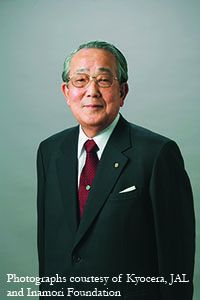
INAMORI: When I was young, I thought about what I should do to be successful. Achievement in life varies among individuals. One of the factors is hereditary abilities, such as intelligence, health and athletic ability. In addition, effort and attitude are factors. I believe results are the product of these three elements. If someone with average abilities wants to succeed, he or she has to have excessive effort and a good attitude. Since it is not the sum of the factors but a product of the factors, a poor philosophy would have a much larger negative impact even if the other two values are high. Therefore, I did my best believing that very strong effort and a good attitude would produce substantial results, and it led to success.
TJ: Why did you decide to become a Buddhist priest?
INAMORI: I have always sought serenity in order to live a good life and to have a good philosophy toward life. I was fortunate to encounter Master Nishikata, a monk of the Rinzai school of Zen, and enjoyed conversations with him. I wanted to polish my understanding of Buddhist philosophy in an effort to be a good person, and he suggested entering the Buddhist priesthood for ascetic training or Zen meditation in a temple. However, I couldn’t afford a lengthy retreat in a temple, so I continued on in my job.
TJ: Do you think the decision to become a Buddhist priest helped you in business?
INAMORI: I think being committed to the teachings of Buddha and being calm has had a positive impact on my work. Even when business does not go smoothly, I am not pessimistic, as I believe things will go well if I do good things. On the other hand, if my business goes very well, I continue trying hard and avoid being arrogant. “Be humble, not arrogant, and work hard,” is my motto.
TJ: Would the same philosophies that you have applied in business work in politics?
INAMORI: I think they are applicable. But in reality, they don’t take form. In politics filled with Machiavellianism, things don’t proceed as expected. Takamori Saigo, for whom I have the utmost respect, was a driving force behind the Meiji Restoration, [and he] emphasized decency and remained humble. He tried to get involved in the new government and share his great philosophy, but other politicians shunned him, criticizing him for being too pure-hearted and naive. As such, in political circles where interpersonal relationships are very complex, the same philosophy wouldn’t work as one would hope.
TJ: What do you think of Abenomics?
INAMORI: The government has executed an easy money policy for the purpose of economic recovery, but it won’t easily produce results because the economy is very complex and is based on many intertwined factors. I think what is really necessary is people’s commitment to changing the status quo. It is wrong to hope for economic recovery by simply relying on others to create an easy money policy. I hope that people begin to understand this so that we can begin to move in the right direction soon.
TJ: What is your proudest achievement?
INAMORI: Establishing DDI, the predecessor of KDDI. When the telecommunications market was privatized after a long monopoly by Nippon Telegraph and Telephone (NTT) since the Meiji era, we, mainly Kyocera, established DDI to lower surprisingly expensive phone bills. Our action was described as reckless, but now KDDI has grown to compete even with NTT.
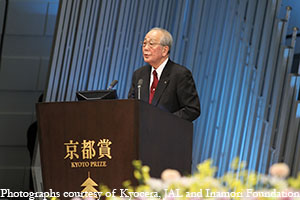
TJ: In 2010, you were made chairman of the then-bankrupt Japan Airlines and successfully led the company to being relisted on the stock market. What were the biggest challenges you faced in the restructuring?
INAMORI: After Japan Airlines collapsed, the restructuring plan was made by trustees and others according to the Corporate Rehabilitation Law. I was asked to head that course of action as a leader. I repeatedly refused, but finally I accepted. Based on the restructuring plan, Japan Airlines had to solicit the voluntary retirement of 15,000 to 16,000 employees out of more than 50,000 employees. It was also extremely important to secure jobs for the remaining 30,000 employees. In the end, we had to dismiss approximately 160 designated employees. Their legal battle continues even now and they sometimes criticize me using campaign vehicles in the Kyoto area. On the other hand, almost every month more than 200 employees gather after work to pledge their commitment towards improving the state of affairs, recalling the hardships of the restructuring days. I am pleased that many people are happy.
TJ: 2014 marked the 30th anniversary of the Kyoto Prize. Can you tell us why it was established?
INAMORI: I was engaged in the research and development of fine ceramics and strongly felt there were no recognized awards for scientific researchers. Around 1980, Professor Ban of Tokyo University of Science established the Ban Memorial Award, and I was chosen to be the recipient. I was grateful for the cut-glass vase they gave to me, but suddenly I was ashamed of myself for being pleased with an award that an ordinary professor established by using his modest patent royalties. I established the Kyoto Prize because I thought I should do something to reward those who conducted scientific research that had gone unnoticed by others. Since I wanted to make it reputable like the Nobel Prize, I had numerous meetings with people from the Nobel Foundation, and took part in their ceremony and banquet, which led to the establishment of the Kyoto Prize.
TJ: What do you think of last year’s recipient of the Nobel Prize filing lawsuits insisting that he wasn’t sufficiently rewarded for his invention by his former employer?
INAMORI: Since he received a salary from his company for creating his invention using company resources and facilities, I don’t agree with him. But I think someone who is dedicated to research should be recognized appropriately.
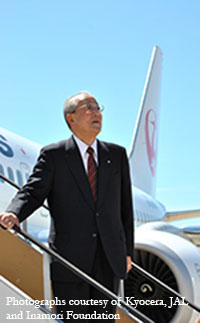
TJ: What reforms, if any, would you advise for Japan’s educational system?
INAMORI: Morality, how people are supposed to be, should be taught at an early stage of elementary school. The Japanese education system has been missing that. This is due to the fact that after WWII the Japan Teachers’ Union rejected such education, citing that religion is like drugs. In addition, university liberal arts programs should include philosophy as a compulsory subject. Since there have been several scandals [related to financial and research ethics] at research institutes recently, students should learn liberal arts subjects [such as philosophy and ethics] as part of their general education before they go into their major.
TJ: What is the biggest challenge that the youth of Japan face today?
INAMORI: It may sound paradoxical, but the fact that young Japanese can live without applying themselves in this peaceful and rich nation is the biggest challenge for them.
TJ: You have been working on solar energy for years. What are your thoughts on nuclear energy?
INAMORI: As the world population continues to increase, electricity is essential for us to maintain a highly developed society. Until now, we have depended on fossil fuels, but because of factors such as pollution, global warming and limited resources, nuclear power might be necessary. But since the issue of how to handle spent nuclear fuel remains unresolved, we cannot concede to the fact that it is a necessary evil. However, solar energy can only generate a small portion of the electricity we need. The energy issue is a really big problem for us. According to the teachings of Buddhism, you will be happier than ever when you appreciate what you have by telling yourself, “I think this is enough.” If mankind continues to require a richer and more highly developed society, it will lead to destruction. But in a capitalist society, an attitude like, “I think this is enough” would stagnate the economy. The economy flourishes when more products are introduced, so it is a paradoxical situation.
TJ: What is your hope for the future of Japan and Japanese people?
INAMORI: Japan is a peaceful country with strong economic power and the nature of cherishing peace. I believe Japanese people should put more value on their own nature, which other ethnic groups would embrace and have regard for, instead of pursuing economic or technological success as in the past. We should cherish our virtues that other ethnic groups would never be able to encroach upon – politeness, kindness, gentleness and gratitude. My book, A Compass to Fulfillment: Passion and Spirituality in Life and Business, which sold 1.11 million copies in Japan, also sold 1.5 million copies in China. Many Chinese managers have shown respect for my philosophy and thankfully more than 2,000 people have come to listen to each of my lecture presentations. Although many things have happened in the past between our two nations, I believe we can find a way for a better future by appreciating these virtues. tj
京セラ創業者稲盛和夫が経営哲学を語る
実業界のイノベーターが実践する仏教思想とビジネスの融合
実業家・稲盛和夫氏は慈善家、哲学者でもあり、日本のビジネス界における伝説的存在だ。京都を本拠地とする電子機器、セラミック製品のグローバル企業 京セラ、また通信事業大手の KDDI を創業し、日本航空再建の際は会社更生法の適用を申請した危機的状況から、東京証券取引所に再上場を果たすまでの復活を遂げる原動力となった。また、私財を投じて設立した稲盛財団を通じ、人類社会の進歩発展に貢献した個人や団体を顕彰するために国際賞「京都賞」を創設。自らの経営塾「盛和塾」では若手経営者に経営哲学を伝えている。在家得度を受けており、仏教思想に基づく経営スタイルに感銘を受ける社員は多い。その興味深い思想と優れた業績について、東京ジャーナルの川合美雪が稲盛氏に話を聞いた。
川合美雪によって
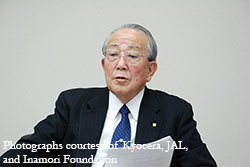
TJ: 典型的な西洋的マネジメントとの対比における、ご自身の経営スタイルの特徴をあらためて教えてください。
イナモリ : 欧米では成果主義が基本です。社員に対し報酬などのインセンティブを提示し成果を出すことを求めます。ですから、目的はいわば利己的です。しかし、私が目指すのは、仏教に通じる利他的な慈愛に満ちたマネジメントです。全社員が等しく幸せに気持ちよく働ける環境、報酬面で極端な差をつけないことが目標です。その結果、能力がある人もない人も、努力をし成果を出すことができるのです。
TJ: 人生と仕事についての哲学は年月の経過と ともに変化してきましたか?
イナモリ : 27 歳で京セラを創業してから 56 年になりますが、当時から経営に対する考えはずっと同じで、年と共に変化しているということはありません。自分が作り上げた人生観、哲学は信念のようなもので、揺らぐことはありませんでした。
TJ: ご自身の成功を支えた核となる原則(考え方)とは何でしょうか。
イナモリ : 若い頃、成功するためにはどうすればいいのか考えました。人生の成果は人それぞれ千差万別です。それはなぜか。まず一つには、頭脳、健康、運動神経など持って生まれた能力という要因があります。さらに、熱意(意志)、考え方(哲学)も関係します。私は、結果はこの 3 つの要素の積であると考えました。たとえ能力が人並みでも、成功したければ、人一倍の熱意を持ち、善き哲学を大事にすればいい。足し算でなく掛け算だから、他の 2 つの値が高くても、考えがよこしまなら大きなマイナスになってしまいます。人より大きな熱意、善き考え方を持って生きていこう、そうすれば人が驚くような成果を出せるはずだと信じてやったことが、成功につながったのだと思います。
TJ: なぜ在家得度を決意されたのですか?
イナモリ : 私は常に、良い人生、善き哲学のために平穏な心でいることを目指してきました。縁あって、臨済宗の西方老師と親しくなり、相談や雑談を交わすようになりました。人間として立派に生きるために哲学を磨かなければならないと考える私に、老師が得度を勧めてくれました。ただ、私は長期間仕事を離れて寺で修養したりするわけにはいかないので、在家得度という形になりました。
TJ: 在家得度はビジネスによい影響を与えたと思われますか?
イナモリ : 仏陀の教えに傾倒し、心を整えるために努力したことは、仕事にいい影響を与えたと思います。仕事がうまくいかない時も悲観的にならず、善きことをすればうまくいくと信じれば動じない。逆にうまくいった場合も、当たり前と思いあがらず、謙虚さを忘れず努力を続 ける。「謙虚にして驕らず、さらに努力を」は私の標語です。
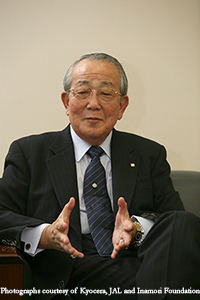
TJ: ビジネスにおける哲学は、政治の世界にも当てはまるのでしょうか?
イナモリ : 本来なら当てはまるはずだと思いま す。しかし、そうなっていませんね。権謀うず巻く政治の世界では、なかなか物事は思いどおりに進まないようです。私が最も尊敬する西郷隆盛は、明治維新の立役者でしたが、生涯礼節を重んじ、謙虚さを失いませんでした。その素晴らしい哲学で新しい日本の政府を動かそうとしましたが、そのきれいな心がかえって新政 府では煙たがられてしまいます。そのように、政治の世界は対人関係が複雑で、本来なら当て はまるはずの哲学もなかなか受け入れられないのです。
TJ: アベノミクスについてはどうお考えになりますか?
イナモリ : 景気上昇のために異常なまでの金融緩和政策をとっていますが、経済は複雑な要因が絡み合うので、簡単に成果は出ないでしょう。景気が上向きになるために本当に必要なのは、現状を変えるための努力をする国民の熱意です。金融緩和などの他力本願で景気回復を願うのは、邪道だと思います。早く国民が自覚して動いてほしいと願っています。
TJ: ご自身が一番誇りに思われる業績は?
イナモリ : KDDI の前身、第二電電を作ったことですね。明治以来、電電公社が独占していた通信市場が民営化された時、正しい競争を実現させて異常に高い料金を引き下げるために、無謀と言われながら、京セラが主体となって第二電電を作りました。その後成長した KDDI は 今や NTT に伍する存在となっています。
TJ: 2010 年に経営破たんした日本航空の会長に就任され再生を見事に成功させられました。日本航空の再建の道のりにおける最大の壁は何でしたか?
イナモリ : 日本航空は経営が破たんして会社更生法の適用を受け、管財人が中心となって再建計画が練られました。その実行に当たりリー ダーが必要だということで、私に声が掛かり、 何度もお断りしましたが結局引き受けることになりました。管財人らの再建計画に基づき、日本航空は、5 万数千人の社員のうち 1 万 5 ~ 6 千人に任意で希望退職を求めました。残った 3 万数千人の従業員の雇用を守ることも重要でした。最終的に、約 160 人の方に指名解 雇で辞めていただくという形を取らざるを得 ませんでした。彼らの法廷闘争は今も続き、京都にまで街宣車が来て、「悪者は会長」と叫んだりしています。 しかし一方で、再建当時の苦労を思い返し、現状に満足せず努力しようと、2 百数十人が毎月のように終業後に集まっているという現状もあり、多くの方が喜んでくれているので、私は 満足しています。
TJ: 昨年、京都賞創設 30 周年を迎えられましたが、その設立動機についてお聞かせくださ い。
イナモリ : 私自身、ファインセラミックスの研究開発に携わり、科学技術の研究者が身近に感じる顕彰が少ないと考えていました。昭和 50 年代に東京理科大学の伴先生という方が、特許の使用料を資金として伴記念賞という賞を創 設され、私は第 2 回の名誉賞に選ばれました。 カットグラスの花びんを頂いて喜んでいたのですが、ふと「恥ずかしい」という思いに駆られました。一介の教授がわずかな特許使用料を使って創設した賞をもらって喜んでいる自分をもう 1 人の自分が責めたのです。京セラが成長した今、人知れず技術開発をした人を認める賞を創設するのは自分の役目ではないかという思いから京都賞を作りました。どうせならノーベル賞のような立派な賞にしたいと、ノー ベル財団と会合を重ね、授賞式や晩さん会などにも参加させてもらって研究をして、創設に至りました。
TJ: 昨年のノーベル賞受賞者が、日本企業は研 究者の業績に正当に報いていないと主張して 訴訟を起こしたことは知られていますが、そう いった技術者の思いに報いたいと?
イナモリ : 会社で給与をもらい、研究環境もすべて会社が整えてくれた中での成果は、決して研究者個人のものではないので、その主張には賛成できません。しかし、寝食を忘れて研究に打ち込む研究者の姿勢は顕彰されるべきだと思うのです。
TJ: 日本の教育制度に改革を望むとすればどういったことでしょうか。
イナモリ : 道徳、修身といった人間としてあるべきことは、早い時期から子供にきちんと教えなければならないのに、日本の教育にはそれが欠落しています。戦後、日教組が「宗教は麻 薬のようなものだ」と、そういった教育を否定してきた弊害だと思います。また、大学の教養 課程でも、一般常識的な知識に加え、哲学を必須科目として教えるべきです。昨今、研究機関の不祥事が目立ちますが、一流の人間でなければ一流の研究はできないはずなので、専門分野の教育以前に、人間として共通する教養課程をきっちり教えるべきだと思います。
TJ: 今の日本の若者が直面する最大の試練は何だと思われますか?
イナモリ : 逆説的な言い方になりますが、今の日本は平穏で豊かで、努力しなくても何となく過ごせてしまいます。そんな環境が、かえって若者には試練なのではないかと思います。
TJ: 早い時期から太陽光発電に取り組んでこられましたが、原子力エネルギーについてはどうお考えになりますか。
イナモリ : 世界人口が増加し続ける中、高度な文明社会を維持していくためには、電気は人類にとって非常に重要です。今までは化石燃料に頼っていましたが、公害や地球温暖化、資源の有限性などの要因を考えると、原子力発電は必要不可欠なのかもしれません。しかし、使用済み核燃料の処理問題が未解決である現状では、 原子力発電を必要悪とあきらめるわけにもいかない。しかし、太陽光発電は、人類に必要な電力のごく一部をまかなっているに過ぎませ ん。エネルギー問題は、人類にとって本当に矛盾をはらむ大きな問題です。 仏教の教えに、「足るを知る」という言葉があ ります。人類がこのまま更なる豊かさ、高度な文明を求め続ければ、破滅の縁に転がり落ちると思います。しかし、資本主義社会では、「足 るを知る」を実践すれば経済は停滞してしまい ます。少しでも余計に作った方が経済は活発化します。どうにも矛盾する問題です。
TJ: 日本と日本人の今後に望むことは?
イナモリ : 先進国の中でも豊かな経済力を持ち、平和を愛好する日本は、平穏な状態にあると言えます。日本人は、かつてのような経済大国、技術大国を目指すのではなく、どの民族からも尊敬され愛される人間性や人柄を重んじるべきだと思います。礼儀正しく、親切で、優 しく、感謝の気持ちを忘れない。どの民族も侵しがたいそういった美点を大切にすべきです。 私の著書「生き方」は日本で 111 万部が売れましたが、中国語版も 150 万部が売れました。 多くの中国人経営者が私の哲学に敬意を払ってくれて、講演会には毎回 2 千人以上が集まります。国家間では過去にいろいろあっても、日本人の素晴らしい姿勢を大切にすれば必ず道は開けると思います。tj
The original article is available in Issue #276. click here. to order from Amazon





